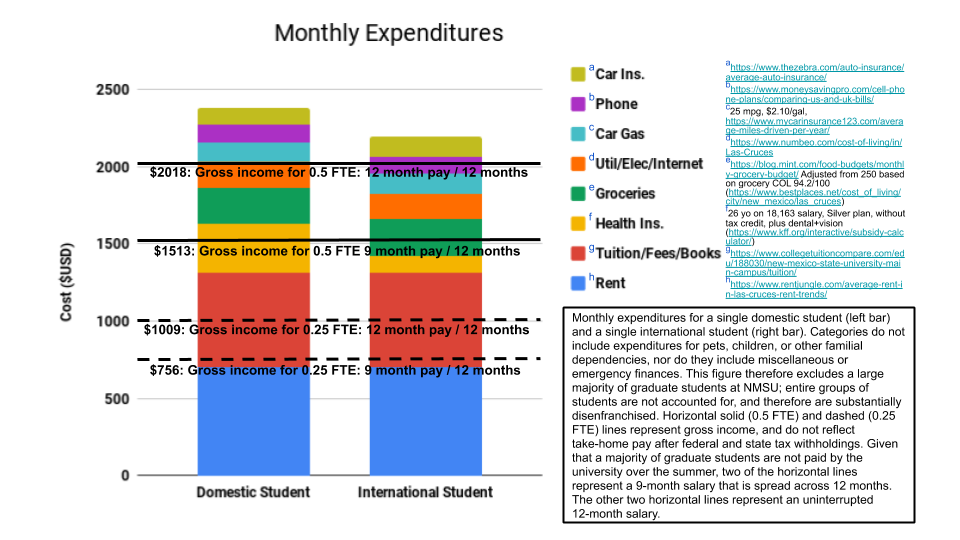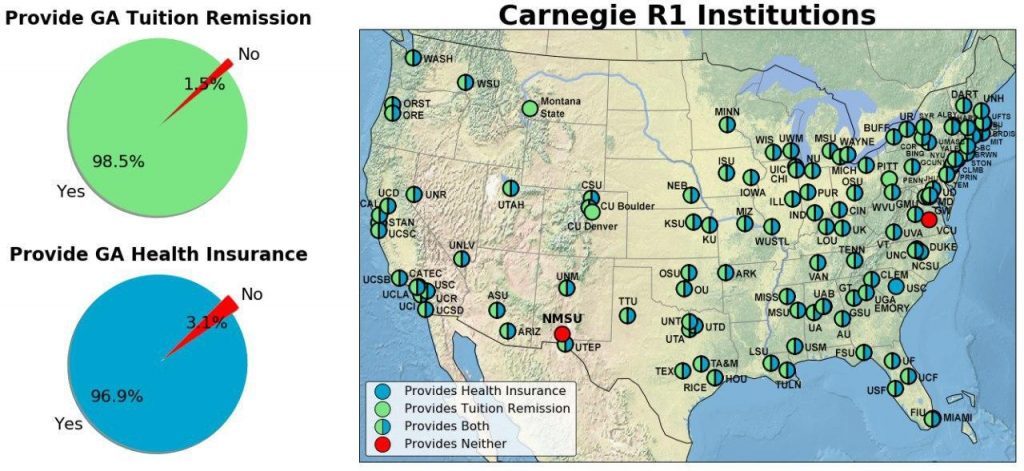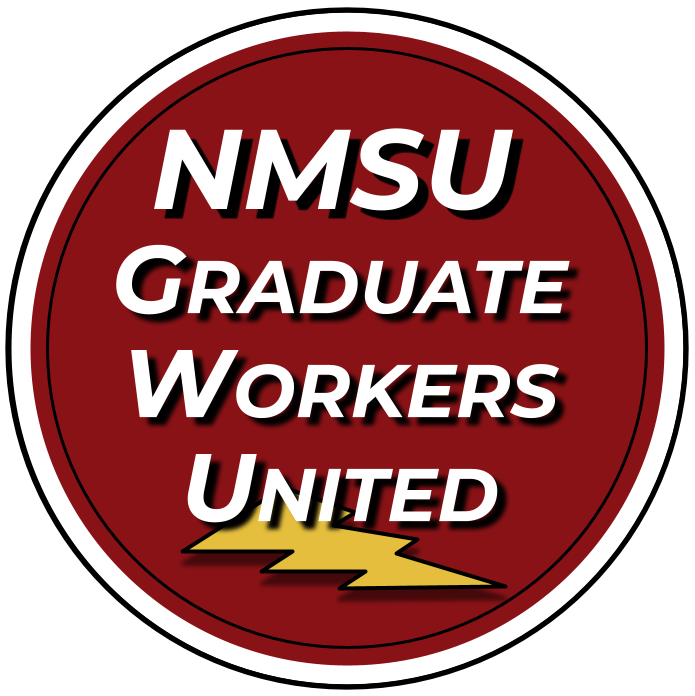To the Offices of the President, Chancellor, and Board of Regents of NMSU,
An integral part of the New Mexico State University LEADS 2025 strategic plan is the attainment of Carnegie R1 research status by the year 2025. In our research, we have determined that approximately 98% of all R1 institutions provide several benefits for their graduate students that are notably lacking at NMSU. Pursuant to the NMSU LEADS 2025 goals we, therefore, demand the following necessary changes in the working conditions of graduate workers:
- Full Tuition Remission
- A $5,000 pay increase, and yearly 4% cost of living adjustments
- Full summer employment for all graduate workers
- Comprehensive health insurance, including dental and vision.
In light of the COVID-19 pandemic, it is an absolute necessity that the university provides comprehensive health insurance to graduate workers. The external review of the graduate school released in Fall 2018 calls for many of these changes, yet the administration has failed to address these issues. Below we will justify why these are needed to help NMSU reach R1 status and place New Mexico on the map as a destination for aspiring researchers and educators.
At NMSU, there are approximately 900 teaching and research assistants, collectively known as graduate workers, who provide a significant amount of instructional and research labor at our university. Teaching assistants take on an immense teaching load, usually introductory courses and labs, which present unique challenges, even for veteran instructors, due to a lack of a shared background among new students. These courses are often the most important/instrumental courses as they provide students with a solid foundation for the rest of their college careers. An important (but often overlooked) aspect of being a teaching assistant is grading homework, quizzes, labs, and exams — another vital part of the instructional process at any university. NMSU graduate workers provide, among their other duties, significant mentoring and tutoring services to undergraduate students, and are counted on as a vital tool for undergraduate success.
Graduate workers also provide a large portion of the research labor at our New Mexico universities. At NMSU, research assistants perform crucial experiments, rigorously collect data and observations, research archived works, and publish academic journal articles. Research assistants also write grants and contribute to the writing and other labor behind the grants submitted by professors, which serve as a major source of funds for research at our university.
Despite the tremendous labor that graduate workers provide the University and the fact that all graduate workers have advanced education and training in their field, the financial situation is dire. At NMSU, graduate workers on a 20-hour week salary earn $18,163 for the nine-month period of August to May (1). Most graduate workers must pay tuition, which as a full-time student (9 credit hours) is $6,138 for the academic year (2). This results in a pre-tax income of $12,025, which is well below the poverty threshold of $13,300 for single adults according to US Census data in 2019 (3). This does not include the cost of healthcare and other pertinent costs (see Figure 1). The cheapest market healthcare plan costs approximately $240/month and is not accepted at the Memorial Medical Center, the closest medical facility to the NMSU campus. Many graduate workers at NMSU travel to Juarez, Mexico for healthcare because they cannot afford healthcare in Las Cruces or El Paso.

This is unacceptable, especially in light of the COVID-19 pandemic. NMSU has a responsibility to keep its workforce, including graduate workers, safe. With this $6,138 tuition cost, many graduate students take out loans to pay tuition, with the average NMSU GA in a $4,100 annual deficit. Using average living costs in Las Cruces, we demonstrate the financial unsustainability of obtaining a highly specialized degree at NMSU in Figure 1.
This financial situation carries additional negative consequences for international students. Due to their visas not allowing employment outside of their field, many international students who are only employed for 9 months by NMSU cannot get paid during the summer. Additionally, NMSU is required to provide international students with health insurance by law. However, this has amounted to unstable coverage and a lack of clarity over the provided plan. On top of this, the university requires payment for the insurance plan before international students can enroll in classes, often putting international graduate workers at a vulnerable financial situation at the beginning of the academic year.
The NMSU administration has failed to address these graduate issues, against the recommendation of an external review panel of the Graduate School in Fall 2018. In subsequent meetings with students, the Graduate School has continued to ignore and has failed to address such problems. Graduate students at NMSU cannot thrive or be adequately productive under the major financial stress caused by the lack of tuition remission, lack of insurance, and insufficient compensation.
If NMSU is to reach Carnegie R1 status, the university will need to boost its research productivity. As the providers of a massive amount of research labor at NMSU, graduate workers deserve a fair solution to manage their financial stress which otherwise hinders their productivity. Outlined in Figure 2, of the 131 universities across the country recognized as a Carnegie R1 institution, the vast majority (126) provide full tuition remission, higher pay, and insurance to their graduate workers. NMSU is a non-competitive option for promising prospective graduate students; over half of graduate workers we surveyed would not recommend NMSU for graduate school. NMSU needs to be able to attract more graduate students to further boost research productivity at NMSU.
The benefits gained by providing equitable conditions to NMSU’s graduate workforce extend beyond the confines of the university system as well. The Las Cruces region, as well as the wider state of New Mexico, benefit from the technological and scientific expertise provided by the graduates of NMSU. The seemingly-arbitrary restrictions unfairly levied against NMSU graduate workers are, therefore, actively against the best interests of the state of New Mexico. Besides the unnecessary burden on the public systems of an already-impoverished state, through the inability of many NMSU graduate students to obtain basic living expenses, the damage done to the scientific and technological future of New Mexico is far-reaching. Barriers to the progress and success of graduate students at NMSU disadvantage these students in their future careers, and disincentivize them from remaining to bolster the technological progress of the state.

If New Mexico State University plans to reach Carnegie R1 status, offer competitive wages and benefits to attract new graduate students, and achieve the strategic goals of NMSU LEADS 2025, we see these changes for graduate workers as an absolute necessity. Granting graduate workers full tuition remission, guaranteed summer employment, increased pay, and a comprehensive health insurance plan is absolutely mandatory to improving the quality of life for graduate workers at NMSU. The administration must act quickly to implement these changes at NMSU, and prove that they recognize the high value that graduate workers bring to the University.
